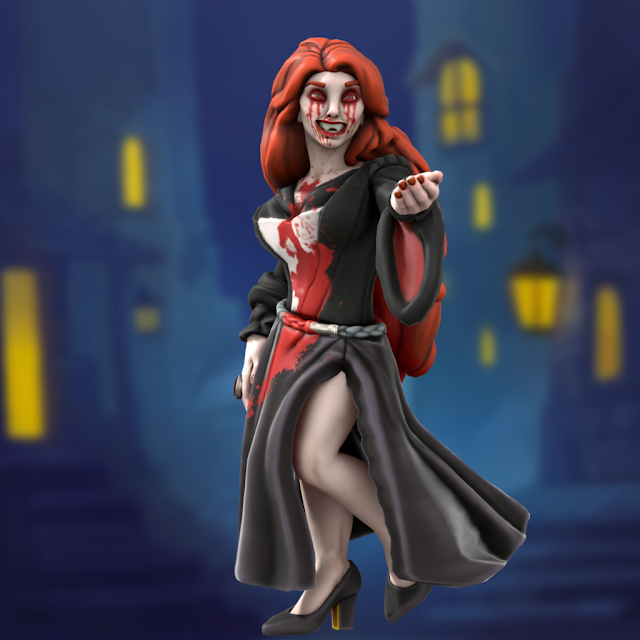One of the first adventures I worked on for OSR publication was called "The Tomb of the Vampire Princess" or "Vampire Queen" or "Palace" depending on my mood at the time.
I essentially saw it as a sequel of sorts to the original Wee Warriors / Pacesetter Games "Palace of the Vampire Queen". But a few things happened. First Mark Taormino published his own "Hanging Coffins of the Vampire Queen" which was AWESOME. Then Bill Barsh of Pacesetter Games produced some sequels of his own with Castle Blood and Crypts of the Living.
So the need for my own sequel dwindled.
A couple years back Small Niche Games produced Guidebook to the Duchy of Valnwall. I had the pleasure of working on that product. I submitted a character to be "Saint" in the game, Father Johan Werper, my very first D&D character ever. When I got my copy I was so thrilled. Something I had wanted to happen for ages was going to happen, Johan was going to be a real saint in a "D&D" book! I opened it up and I was not disappointed at all! Moreover the book's main author and designer Pete Spahn had added this section:
He died in a tragic tale that is recounted in the Hunt for the Dark Mistress, where he tracked down and slew Darlessa the Vampire Queen who had abducted his granddaughter.Pete never contacted me about this and I could not have been happier! Without knowing it he included things that happened in my game; Johan dying and leaving his granddaughter, Celene, behind (Celene was my first 2nd Ed character, and afraid of the dark. Now I know why). The use of holy oil in my games (does 1d8 damage to undead; more when lit) and of course giving a name to an enemy that had been lurking in the back of my mind ever since I first read about Elizabeth Bathory.
Unfortunately, Johan was himself cursed by the taint of the vampire's blood. Rather than remain an undead abomination, he bid goodbye to his granddaughter and used the last of his strength to douse his body with oil and set himself alight.
It was like throwing a deck of cards into the air and having them land in a perfect house of cards.
So modules V5 and V6 combined will cover a lot of similar territory to what I was going to do in my adventure. So I'll just drop that and keep the elements that are new. The opening of the crypts.
I have a stack of various notes, maps, ideas and going through them all I think I have something pretty cool here. I'll have to get it all together in time for my annual Halloween horror game.
Right now the working title is Descent into the Crypts of the Vampire Queen. It will be my homage to the great adventures of the Golden Era but also a nod to the two Vampire Queen adventures that brought me so much joy.
Here she is for Advanced Labyrinth Lord.
Darlessa, The Queen of Vampires
Female Vampire Witch, Demonic Tradition
No. Enc.: 1 (Unique)
Alignment: Chaotic (evil)
Movement: 120’ (40’)
Fly: 180’ (60’)
Armor Class: -5 (bracers of defense, amulet of protection, ring of protection)
Hit Dice: 13
Attacks: 1 (touch, see below) or spell
Damage: 1d10, drain 2 points of Constitution, witch Spells
Save: W13
Morale: 12
Hoard Class: XXII
XP: 11,400
Str: 18 Int: 15 Wis: 14 Dex: 18 Con: (18) Cha: 22
In addition to the powers of a vampire, Darlessa has the following witch spells and Occult Powers. She casts as a 13th level witch.
Spells by Level
Cantrip (3+5): Alarm Ward, Black Flame, Daze, Knot, Mend, Mote of Light, Object Reading, Spark
1st (4+3): Burning Hands, Cause Fear, Everlasting Candle, Hecate's Spiritual Dog, Minor Curse, Read Languages
2nd (4+3): Agony, Bewitch II, Burning Gaze, Enthrall, Ghost Touch, Produce Flame, Rite of Remote Seeing
3rd (3+2): Astral Sense, Clairaudience/Clairvoyance, Danse Macabre, Toad Mind, Tongues
4th (3+2): Arcane Eye, Bewitch IV, Elemental Armor, Moonlit Way, Phantom Lacerations
5th (2): Death Curse, Greater Command
6th (2): Death Blade
7th (1): Wave of Mutilation
Occult Powers
Familiar (Undead Raven)
Evil’s Touch
Devil’s Tongue
Magic Items
Intangible Cloak of Shadows, Amulet of Protection* (also prevents cleric turning), bracers of defense, ring of protection, ring spell storing.
Links to Adventures
- V2 Palace of the Vampire Queen reprint from Pacesetter Games
- V5 Palace of the Vampire Queen: Castle Blood (Pacesetter Games)
- V6 Palace of the Vampire Queen: Crypts of the Living (Pacesetter Games)
- MM1 Hanging Coffins of the Vampire Queen (Maximum Mayhem Dungeons / Dark Wizard)
- COA04SE: Guidebook to the Duchy of Valnwall Special Edition (SNG)
- Palace of the Vampire Queen
- Getting Basic
- All Hail the Vampire Queen!
- Into the Lair of the Vampire Queen
- A to Z of Vampires: Vampire Queen
- Weekend Gaming: Halloween Gaming, Return of the Vampire Queen




























